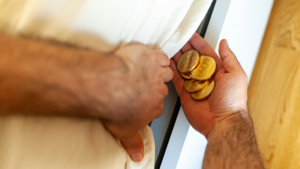Top 6 Signs Your Spouse is Hiding Crypto
Is my spouse hiding Crypto? We know hiding assets is a penalty-inducing divorce tactic used by many. But in 2022, soon-to-be divorcees are hiding money from family members and authorities using cryptocurrency.
Cryptocurrency nowadays can add new complications to a divorce. Just like any other marital asset, if cryptocurrency, or other digital currency was purchased, or increased in value, during the marriage, it is a marital asset that is subject to distribution in both equitable distribution and community property states.
In the fourth part of our Crypto Currencies and Divorce series, we discussed the situations in which we discussed the situations in which cryptocurrency can be found during the divorce settlement process and also if it can be lost within the settlement. While tracking down the funds isn’t an easy process, this article will give you signs to watch out for.
Here’s what you need to know if your spouse is hiding crypto.
1. Bank and Credit Statements
First things first, if you believe that your spouse is hiding cryptocurrency and has used marital money to purchase it, you should take an active role in looking for proof of your suspicions.
Cryptocurrency is usually purchased with liquid cash, so at some point money moves from a bank account into a cryptocurrency exchange. Certain websites function as the entry point for most people interested in obtaining or trading Bitcoin and other digital currencies. Look for popular echange names such as: Coinbase, Binance, Etoro, Coin Switch, Luno and PaxForex. All it can take is one initial transaction in “normal dollars and cents” to enter this new world of Bitcoin, where untold more digital currency can be obtained.
If you see any crypto activity, however insignificant, it’s worthy to investigate further — especially if your spouse omitted it from the initial deivorce documentation.
2. Crypto Wallets and Private Keys
Crypto keys make for excellent evidence. Each crypto wallet comes with a key that can then be traced to show all transactions associated with the wallet. A sure sign of Crypto activity in the household is the discovery of a crypto key. But not many know what to look for, since the key doesn’t represent a traditional metal object. So what do these keys look like?
A private key is a secret, alphanumeric password/number used to spend/send your bitcoins to another Bitcoin address. It is a 256-bit long number that is picked randomly as soon as you make a wallet.
The degree of randomness and uniqueness is well defined by cryptographic functions for security purposes.
This is how the Bitcoin private key looks:
2zJ4kLf5zgWrnogidDA76MzPL6TsZZY36hpXXssSzNydYXYB9fe
Many of these password keys are stored on a keydrive. If you happen to find this key, take note of it for evidence. Many hide these keydrives in a private and secure place, such as a safe, while others can simply save these password key codes hidden on their laptops.
3. Presence Crypto Exchanges in Apps
See if there are any crypto-related apps installed on shared electronic devices. Look for Bitcoin wallets like Coinbase, Mycelium, Ledger, SoFi, and Trezor, or apps for buying and selling crypto, like CEX.IO or BlockFi.
Any of the common exchanges listed above offer apps for mobile crypto banking. If you share one phone account, you may be able to access the history of all apps downloaded to any phone on your plan. If you are not able to obtain this information on your own, your attorney can add to this to items to be produced during discovery.
4. Loan Applications & Tax Returns
Another area to explore are loan applications and tax returns. If a person is trying to hide assets from you, and they are not disclosing Bitcoin or other cryptocurrencies on their net worth statement, they might record it on a loan application.
It’s also important to check if your spouse has reported crypto on tax returns. Reporting of digital currency is required by the IRS, even though there are those who fail to do so. In 2014, the IRS declared that virtual currencies are property.
5. Large Online Purchases
For spouses who are hiding currency, they don’t buy the initial crypto to put in their wallet, which in turn, avoids any direct charges made to a bank or credit account. Instead, they connect with a crypto user in one of the many user forums who is willing to accept goods that will be paid in said cryptocurrency.
The agreement might entail buying items of the crypto owner’s choice on Amazon, and in return, this crypto will be deposited in the owner’s empty wallet, giving them their entrance into this world. It’s important to remember that crypto wallets function completely outside the normal banking system, so no one will be the wiser should this transaction take place — unless you get smart about your spouse’s buying habits.
Scan Amazon and other online sellers. If you don’t have access to your spouse’s Amazon account, this can be something that your attorney requests to see during divorce discovery.
6. Secretive Behavior with Finances
If you still receive paper statements this is a great way to track down their use of bitcoin and other cryptocurrencies. If the paper trail used to show up in the mail and then suddenly stopped – that’s a red flag and should raise some suspicion.
It’s important to have passwords to all of your shared online bank and credit accounts, but if they’ve been changed, that’s again, another red flag. Call your bank and credit card company to request copies be sent directly to you for all joint accounts. Let your attorney know as soon as possible so that steps can be taken to make your spouse produce documentation of all joint accounts.
Final Thoughts
If you know or suspect that cryptocurrency will be a part of your divorce, talk to your family law attorney immediately and put together a game plan for dealing with it.
At Masters Law Group, our team of attorneys are highly experienced in dealing with Cryptocurrencies in divorce and are here to answer your questions about divorce and digital asset division.
Contact us here today for more information, or to schedule a consultation












